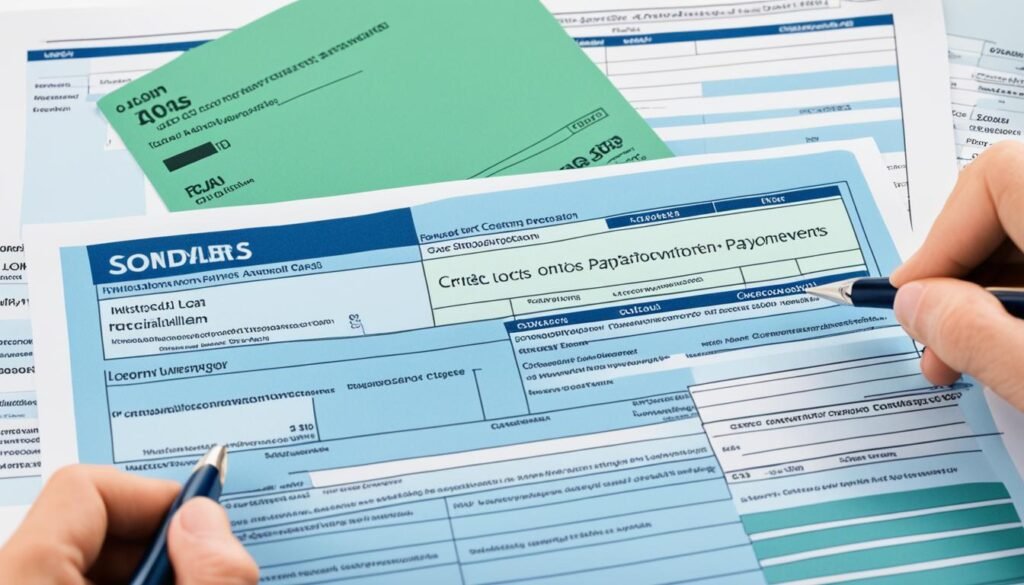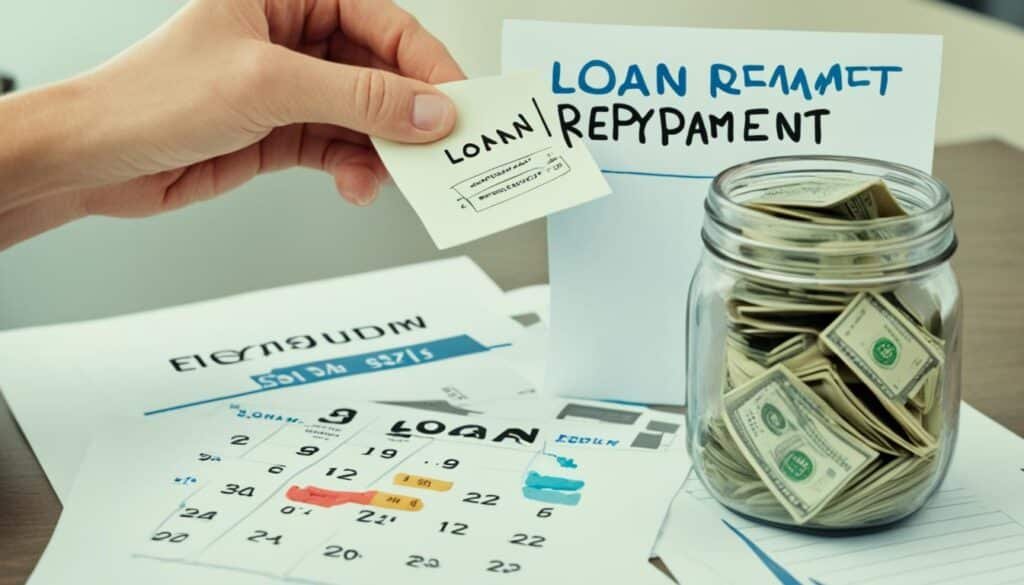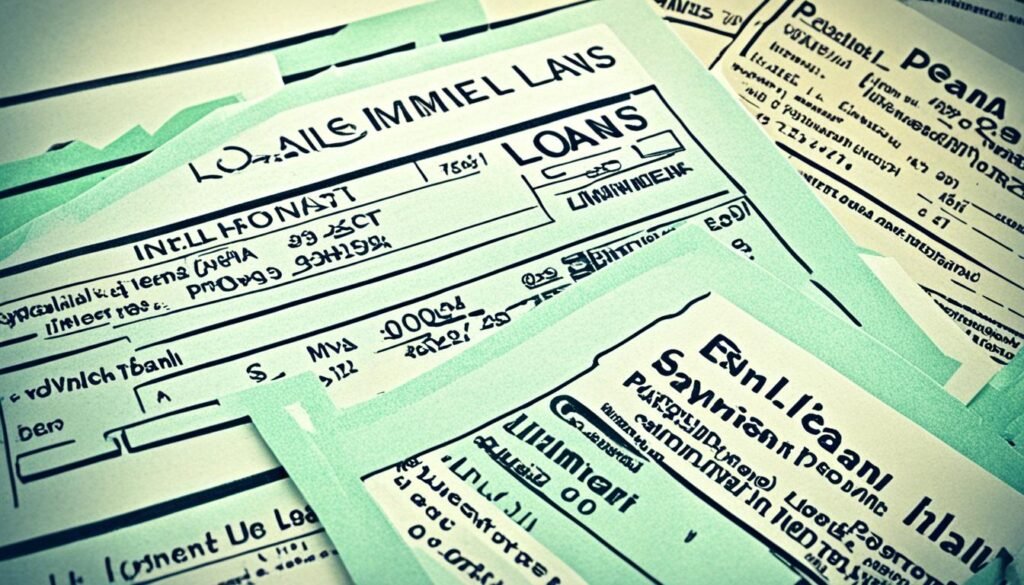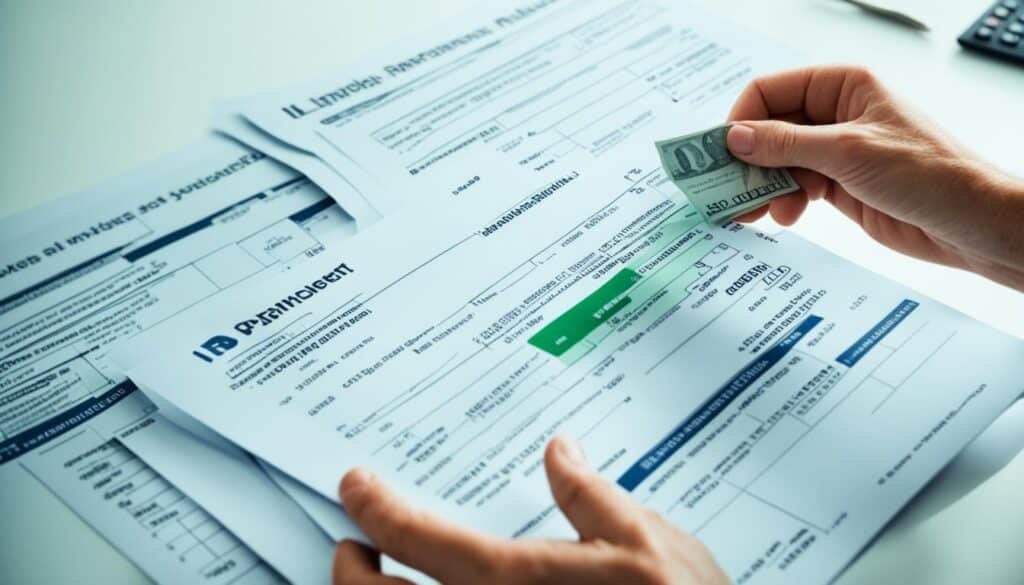An installment loan helps you borrow money and pay it back in equal parts over time. You repay it with fixed, monthly payments. You might use such loans for various needs, like buying something big, reducing debt, or handling sudden expenses. These loans might need a guarantee, such as your house or car, or they can be without one.
They’re familiar in things like personal loans, home mortgages, car loans, or student loans. These loans usually come with interest that stays the same and a schedule to pay back. That schedule could range from a few weeks to decades.
Key Takeaways
- An installment loan lets you borrow a lump sum and pay it back in fixed monthly amounts.
- You can use these loans for many things, such as big buys, consolidating debt, or unexpected costs.
- They may be with or without something valuable to back them up.
- Examples include personal loans, home mortgages, car loans, and student loans.
- These loans come with set interest rates and payback times, from weeks to years.
Defining Installment Loans
Installment loans are a type of loan where you get a big amount of money at first. Then, you pay back the money little by little, usually every month. This makes them different from using credit cards or payday loans.
Key Features of Installment Loans
These loans have special features:
- Fixed repayment schedule with equal, periodic payments
- Fixed interest rates, which provide predictable monthly costs
- Inability to reuse the funds once the loan is paid off, unlike revolving credit
- Typically longer repayment terms, ranging from a few months to several years
Types of Installment Loans
Here are different installment loans for various financial needs:
- Personal Loans: These loans can be used for many things, like combining debts, making home changes, or dealing with sudden costs.
- Mortgages: They are loans for buying a home or real estate, and you pay over a long time.
- Auto Loans: These loans help in getting a vehicle, whether it’s new or used.
- Student Loans: They support the expenses of going to college, like tuition, fees, and where you stay.
- Payday Loans: These loans are for quick, but they cost more due to high interest, commonly until you get paid again.
- Buy Now, Pay Later (BNPL): It’s an option to buy things now and pay for them later in small, fee-free parts.
These loans can be backed by something of value, like a house or a car, or they can be without any backing at all.
“Installment loans provide a structured, predictable way for borrowers to access the funds they need and pay them back over time.”
Also Read :What Is A Loan Disbursement?
How Installment Loans Work

Installment loans are simple and easy to understand. You get the full loan amount at the start. Then, you pay it back with equal monthly payments. These payments cover the loan’s main amount and the added interest.
The interest rate for these loans doesn’t change. This makes it easy to know how much you’ll pay each month. If you have a loan where rates can change, this might not be the case. The time to pay back the loan can be quite variable, from just a few weeks to up to 30 years.
Loan Disbursement and Repayment Process
Here’s how getting an installment loan usually works:
- First, you apply for the loan. You tell the lender about your credit, income, and maybe offer some collateral.
- The lender checks everything and decides on your loan’s details, like the amount, interest, and how you’ll pay back.
- Once you’re approved, the full loan amount is put into your bank account.
- You start paying back in fixed amounts each month, including the loan’s main part and interest.
- The loan ends when you make the last payment at the end of your loan term.
While each lender and loan type might have some differences, these main steps are usually the same for all installment loans.
“The beauty of an installment loan is the predictability it provides. With fixed monthly payments, you can easily budget and plan for your loan obligations.”
Also Read :How Do I Get A Loan Without Credit?
Secured vs. Unsecured Installment Loans

Installment loans come in two types: secured and unsecured. The main difference is whether the borrower has to put up something valuable, called collateral. Secured loans ask the borrower to offer a possession like a house or a car. This makes it easier to get the loan and the interest rate might be lower. But, it does put the borrower’s possession at risk if they can’t pay back the loan.
Now, about unsecured loans; they’re not backed by any collateral at all. Getting one of these usually depends on how trustworthy the borrower seems, which means looking at their credit score and how much they make. They tend to have higher interest rates because there’s no guarantee for the lender.
Deciding between a secured and unsecured loan is about your personal situation and goals. If you have things like a house or a car, you might go for a secured loan to get a better deal. But if you don’t have assets to offer, you might choose an unsecured loan for the extra flexibility, even if it costs you more in the end.
| Secured Loans | Unsecured Loans |
|---|---|
| Require collateral (e.g., home, car) | Do not require collateral |
| Generally have lower interest rates | Generally have higher interest rates |
| Lender can seize collateral if loan is not repaid | Approval relies more on creditworthiness |
| Easier to qualify for | More accessible for borrowers without assets |
Choosing the right type of loan is important. It’s key to weigh the advantages and disadvantages of each to find the best choice for your money situation and what you need.
Also Read :How Does Insurance Protect Against Natural Disasters?
Common Examples of Installment Loans

Installment loans come in many forms, fitting different financial needs. They include personal loans, mortgages, auto loans, and student loans. These loans let you borrow and pay back money over time.
Personal Loans
Personal loans are for various needs, like debt consolidation or home improvement. They can be used for big expenses or sudden surprises. You usually have 2 to 7 years to pay them back, with amounts from $1,000 up to $50,000. But these numbers can change based on your credit and the lender.
Mortgages
Mortgages let you buy a house by financing it over time. You pay this type of loan over 15 to 30 years. The amount you can borrow depends on the home’s value and your financial info. Mortgages might have a fixed or adjustable rate, which can affect your monthly payments.
Auto Loans
Auto loans are for buying vehicles, new or used. They give you 2 to 7 years to pay back, catering to the car’s value and your credit score. With auto loans, the cost of a vehicle can be spread out over time, fitting into your budget.
Student Loans
Student loans help with college costs, from tuition to room and board. You have up to 25 years or more to pay, depending on the type of loan. It allows students to focus on learning without the stress of paying back right away.
Each type of loan has different terms and conditions. They are made to match the unique financial situations of borrowers. So, whether it’s for a car, a house, school, or other needs, there’s a loan that can help.
Also Read :Best MBA Scholarship Programs In Canada
Credit Impact of Installment Loans

Installment loans can majorly affect your credit score, both for better and worse. It’s important to grasp their role in your credit health. This understanding is key before you decide to apply for one.
Typically, applying for this loan type involves a detailed credit check. This check can cause a minor, short-term drop in your credit score. Such drops come from the fact that new credit checks only make up a small part of your credit score.
Yet, by consistently making payments on time, your credit score might actually go up. This happens because properly handled installment loans help show you’re skilled in managing credit. It’s good for your credit score in the long run.
If, however, you start missing payments, it can harm your credit score considerably. Credit inquiries and whether you meet payment due dates are very crucial aspects of your credit score. They are parts of the calculation that can impact your credit health in a big way.
The effects of an installment loan on your credit depend on how you handle them. When used wisely, they can be a positive addition to your credit portfolio. But, misuse can drag down your credit health.
“Installment loans can be a valuable tool for building credit, but it’s crucial to manage them responsibly.”
Also Read :How To Apply For MBA Scholarship Programs In Canada
Pros and Cons of Installment Loans
Installment loans can help you financially, but they have good and bad sides. It’s key to know the installment loan benefits and installment loan drawbacks. This info helps you see if this loan fits your situation.
Potential Benefits of Installment Loans
- Ability to finance large purchases over time. You can pay for big things like home upgrades or a new car through several payments. This makes it easier with predictable payments over a long time.
- Build credit through responsible repayment. Paying on time shows you’re good at handling money. This could boost your credit score.
- Fixed interest rates and payment schedules. Most installment loans have rates that stay the same. So, you know what to pay each time, offering financial stability.
Potential Drawbacks of Installment Loans
- Long-term financial commitment. You’d pay off these loans over years, not just a few months. This long time can be a lot to handle financially.
- Limited ability to borrow more funds. After you get one loan, you usually can’t take out more money using the same loan or credit line.
- High interest rates for borrowers with poor credit. People with bad credit might face more expensive borrowing costs. This is due to higher interest rates.
- Missed payments can heavily impact credit. If you’re late or miss paying, your credit score could go way down. This negative effect lasts up to seven years.
Think carefully about the good and bad of an installment loan before choosing. Considering these factors helps you make a choice that’s good for your money situation. This way, you ensure your financial future is on track.
| Installment Loan Benefits | Installment Loan Drawbacks |
|---|---|
|
|
“Installment loans can be a valuable financial tool, but it’s crucial to carefully consider the potential pros and cons before deciding if they are the right choice for your specific situation.”
Also Read :Applying For MBA Scholarship Programs In USA
Getting Approved for an Installment Loan

To get an installment loan, you need to meet certain criteria. Lenders look at your credit score and your general lender eligibility. These factors help them decide if you qualify for a loan.
Credit Score Requirements
If you have good or excellent credit, with a credit score of 690 or more, you may get better rates. However, even if your credit score is lower, some lenders might still work with you. Yet, you might end up with higher rates or less attractive terms.
When you apply for a loan, lenders will check your credit. This hard credit check could briefly lower your credit score. Some lenders, though, offer prequalification or preapproval. These show you possible terms without affecting your score.
Lender Eligibility Criteria
Lenders also consider other things to decide if they’ll give you a loan.
- Income: They check if you make enough for the loan payments.
- Debt: They look at how much debt you already have. This helps them see if you can take on more debt.
- Collateral (for secured loans): For secured loans, what you use as collateral matters a lot.
Offering more info or having a co-signer can boost your approval chances. Also, showing a stable income history is good when you apply for a loan.
“Keeping a good credit score and handling money well are key to getting better loan terms.”
Also Read :Simplify Your Process With Aidvantage Student Loan
Repaying an Installment Loan

When you pay back an installment loan, you make monthly payments. These payments cover the money you borrowed (the principal) and the interest. The amount you pay each month stays the same, which makes it easier to plan your budget.
To pay off your installment loan successfully, always make your payments on time. Missing payments can hurt your credit score. It’s important to pay on time every month. Setting up automatic payments can help avoid this problem.
Each month, as you pay what you owe, the loan’s balance goes down. Part of your payment lowers the amount you borrowed. The rest covers the interest charges. Over time, you pay more of the principal and less interest.
When you make your last payment, the loan is fully paid off. Then, you’ve completed repaying your installment loan.
| Loan Repayment Factors | Description |
|---|---|
| Monthly Payment | The fixed amount due each month, including both principal and interest |
| Principal | The original amount borrowed that needs to be repaid |
| Interest | The additional charges for borrowing the money |
| On-time Payments | Making payments by the due date to avoid late fees and credit score impact |
Understanding how to repay an installment loan helps manage debt. This way, borrowers can pay off their loans fully and responsibly.
Installment Loan Alternatives

Installment loans have a set timeframe for repayment. But there are other ways to get money that might be better for you. It’s important to look at each option’s flexibility, costs, and terms. This will help you choose what fits your needs best.
Revolving Credit Accounts
Revolving credit accounts are different. They let you borrow, pay back, then borrow again without a fixed end date. This can be really handy for handling surprise expenses.
Home Equity Lines of Credit (HELOCs)
Home equity lines of credit (HELOCs) let homeowners use their home’s equity when they need money. You can borrow, pay off, and borrow again. But, it means putting your home at risk since it’s used as a guarantee.
It’s key to think through the good and bad of each choice. This includes looking at how you pay the money back, the interest rates, and what it does to your credit. Taking time to research will guide you to the smartest decision for your financial future.
“Evaluating all financing options, including installment loans and their alternatives, is crucial in finding the right solution for your unique financial situation.”
The best option between installment loans and other choices depends on your personal situation and goals. By checking out different ways to borrow money, you can pick the path that aligns with what you want financially.
Installment Loan

An installment loan gives you a sum of money at the start. You repay it over time with steady payments. People use these loans for big purchases, consolidating debts, or sudden costs.
They include personal loans, mortgages, auto loans, and student loans, and can be safe or not. Such loans let you predict your monthly expenses. But, they’re a long-term commitment. How you pay can affect your credit score.
What’s special about these loans is they have set equal payments over time. This could be a few months or many years. It helps you plan your budget better. You always know what you’ll pay monthly.
| Type of Installment Loan | Typical Uses | Repayment Period |
|---|---|---|
| Personal Loan | Debt consolidation, home improvement, unexpected expenses | 12-84 months |
| Mortgage | Home purchase or refinancing | 10-30 years |
| Auto Loan | Purchase of a new or used vehicle | 12-84 months |
| Student Loan | Financing higher education expenses | 10-25 years |
Before getting an installment loan, read the terms well. Look at the interest rate, when you have to pay back, and any extra costs. Borrowing responsibly and paying on time can make your credit score better.
“Installment loans are helpful if you’re smart about them. But remember, it’s a big commitment with credit effects.”
Also Read : Unsubsidized Loans Understanding The Basics
Conclusion
Installment loans are helpful for big buys, debt merge, or sudden costs. Knowing their important parts and how they affect us helps in making good choices.
It’s key to really check out the details of a personal, home, car loan, or other installment loan you’re thinking about. This way, the loan can actually help meet your financial plans and not cause issues with your money later.
Deciding on an installment loan, loan, or other finance needs looking at your money situation, credit, and what you need. Making smart choices lets people use installment loans to reach financial dreams and handle the loan well.
FAQs
What is an installment loan?
An installment loan lets you borrow money and pay it back in monthly parts. You pay these parts, called installments, over time. This type of loan can help with big buys, debt combining, or handling unexpected costs.
What are the key features of installment loans?
Installment loans offer you a set amount of money upfront. You then pay it back in equal installments over time. These installments usually have a fixed rate. They’re different from credit cards because you can’t keep borrowing after paying them off.
What are the common types of installment loans?
You find installment loans in many forms, like personal loans, mortgages, or car loans. Student loans, payday loans, and BNPL financing are also common. Some use your belongings, called assets, as insurance for the lender, while others don’t.
How does the loan disbursement and repayment process work?
With an installment loan, you get all the money from the lender at once. You then pay it back over time in monthly bits, including the loan and interest. The rate you pay is fixed, so you know what to expect each month.
What is the difference between secured and unsecured installment loans?
Secured loans need something valuable from you, like a house or car, to guarantee the loan. This makes them easier to get and may lower your interest rate. Unsecured loans, such as personal ones, don’t require this. Instead, the lender looks closely at your financial history.
What are some common types of installment loans?
Common installment loans are those for personal use, buying homes, cars, and going to school. They offer varied loan amounts and terms to fit different situations.
How can installment loans impact your credit?
Getting an installment loan requires a hard look at your credit, which can affect your score at first. If you keep up with payments, your score can increase. Missing payments, however, can lower your score fast.
What are the pros and cons of installment loans?
Installment loans help finance bigger items over time. They come with set monthly payments and can boost your credit when managed well. But, they lock you into a long financial commitment. The interest rates might be high for those with not-so-great credit.
What factors do lenders consider when approving an installment loan?
Lenders look at your credit, income, current debts, and if the loan is secured, the value of your asset. A good credit score usually gets you better deals, but not having great credit doesn’t rule you out completely.
How do you repay an installment loan?
You pay back an installment loan by monthly parts that cover the loan and interest. These parts stay the same over the loan’s life. Paying in full and on time each month is key to keeping your credit score up.
What are some alternatives to installment loans?
Other options than installment loans are credit cards, personal lines of credit, or HELOCs. These offer more flexibility in how you borrow and pay back. Yet, their terms and costs can differ a lot from loans.
Source Links
- https://www.bankrate.com/loans/personal-loans/what-is-an-installment-loan/
- https://www.capitalone.com/learn-grow/money-management/what-is-an-installment-loan/
- https://www.nerdwallet.com/article/loans/personal-loans/what-is-an-installment-loan




